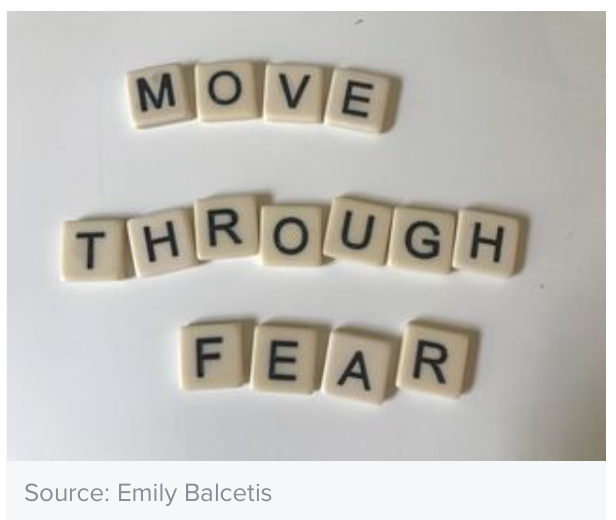Release time: 2020-07-22 14:35
Reclaiming Our Fears
The science and stories of finding fear as a motivating source for action.
By Emily Balcetis and Aaron Dimmock
There has been a lot to fear in 2020. Over 600,000 people have died worldwide from Covid-19, and the number continues to rise. More than 20 million Americans were out of work at the peak of unemployment this year. And as a country, America is divided about what Black Lives Matter and other social protests are for and whether they are a good thing.
These and other social conditions are weighing on our minds, and are producing a fear that the world is collectively sharing, a new study finds. A research team at Nanyang Technological University in Singapore analyzed over 20 million tweets typed in English. They identified that, around the beginning of February, as Covid grabbed hold of the world, over half reflected fear. Though over the next few months our understanding of the virus increased, about one-third of tweets still included elements of fear by the beginning of April.
Experiencing chronic fear isn't sustainable. It takes a toll on us physically. Fear can lead to elevated cortisol, persistent inflammation, and can contribute to heart disease, research finds.
Fear can also lead us to act in ways that are counterproductive to actually keeping us safe. When we believe we have little ability to manage the threats we are facing, we find ways to dampen the emotional stress, but may do so at the expense of acting in ways that actually protect us from physical harm.
For instance, the Ebola outbreak in 2014 through 2016 in West Africa saw fatality rates for those infected hovering around 50%. Sociologist Eric Tenkorang surveyed 800 Ghanaians. His work identified that they generally knew the sources of transmission (e.g. contact with bodily fluids), symptoms of Ebola at onset (e.g. fever), and prevention measures deemed effective by the World Health Organization (e.g. washing hands with soap). But they also reported believing that hot saltwater baths acted as a vaccine. The psychological need for control over a looming threat led some towards choices that served to mitigate the emotional distress but with little benefit of protection against the physical harm they could have been poised to experience.
During COVID-19, anecdotal accounts found that some people responded to the frightening outbreak in a similar way. Some depleted store shelves of toilet paper. Others discussed ingesting disinfectant products. These actions would not vaccinate individuals against the virus, but might have produced an illusory sense of psychological comfort.

But here's the thing. Fear doesn't have to be the catalyst for magical thinking or counterproductive behaviors. It could be a source of energy that we need to make change happen. About 60 years ago, Eleanor Roosevelt said, "You gain strength, courage, and confidence by every experience in which you really stop to look fear in the face." She could not intuit the perfect storm we as society are facing off against now in 2020, but her perspective might be a relevant insight for today.
Aaron Dimmock was a Navy Pilot. Just before the second plane crashed into the World Trade Center on September 11, his wife woke him up. Aaron had received a call from the Operations Officer at his squadron asking if his crew could be ready to fly later that afternoon and through the night to provide imagery, surveillance, and communication near Ground Zero in New York and while patrolling the Atlantic Coast. Without hesitation, Aaron responded, “Yes.”
He and his team completed that mission, working largely in silence, wondering what had just happened, and how they would continue to serve in the days, weeks, months, and years ahead. The fear was there. But so too was the strength and resilience to move through that fear to make change.
Now a retired Naval Officer, Aaron reflects on his experience on September 11. He recognized that acknowledging rather than tamping down the fears we have, and accepting them for what they are, is critical in anticipating and preparing for the next steps needed to move forward, and act.
Social scientists corroborate Aaron's insights. When people experience fear but simultaneously feel empowered to control its effects, the behavioral response can be quite different and proactive. These conditions produce responses aimed at mitigating potential future harm. For instance, researchers found that individuals who learned that they might be at risk for a serious disease but one whose symptoms could be controlled rather than one whose symptoms could not, were more engaged in seeking information about their actual susceptibility.
The fear we may feel now is understandable. But we do have the ability to take control of our fear. Indeed, despite challenges, people are able to implement risk-reducing behaviors that can effectively manage both the emotional and physical threat they face. Social distancing, researchers find, is an effective strategy against Covid-19. Likewise, peaceful social movements are responsible for changing public policy. Several hundred university administrations, for instance, waged and backed lawsuits against the federal administration in response to a policy aimed at removing foreign students from the country who would be attending classes largely remotely. The policy was dropped days later.
Fear can debilitate us. But it can also be the source of energy we need to keep moving forward. What matters is which fork in the road we let fear push us down.
Aaron Dimmock is a retired Naval Officer and Pilot. He is a member of the Chapman & Co. Leadership Institute and currently working on his Ph.D. at L. Douglas Wilder School of Government and Public Affairs at Virginia Commonwealth University. He is studying how candor shapes group performance.

Emily Balcetis, Ph.D., is an associate professor of psychology at New York University and the author of Clearer, Closer, Better.
psychology today